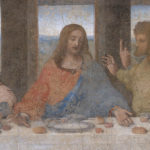
The accents of Halloween, as practiced in America at the time of this writing, offers opportunity for me to accent the theology of Satan, both in his person and in his place in the cosmos. Literature about Satan, the chief of devils and sometimes called a devil, seems not to have made great conscious impact upon the general society. More than 90% respondents say they believe in God. Less than 50 % say they believe in a person known as Satan or Devil. The Devil, whose work seems so obvious to biblical Christians receives considerably less acknowledgment than God receives. We may accept that persons who believe in an omnipotent God would not believe in a Satan, evil as Satan… Read more






